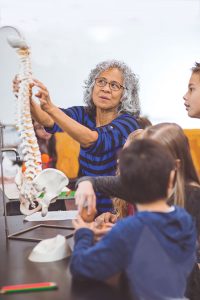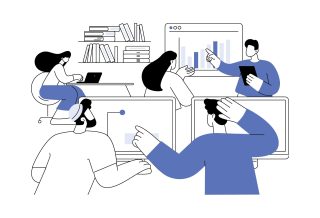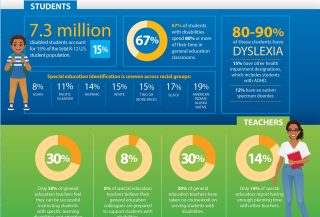RESEARCH
Engaging in science research changes teachers' beliefs and practice
By Elizabeth Foster
Categories: College- and career-ready standards, Research, Standards for Professional LearningDecember 2018
Vol. 39 No. 6
Meaningful and relevant learning is just as critical for adults as it is for students. This is a central tenet of Learning Forward’s work and undergirds the Standards for Professional Learning.
This is especially important when standards for student learning change and there is a gap between how teachers have been teaching and how they are expected to teach given new standards. Professional learning is essential for bridging that gap and supporting that shift in teaching.
The Next Generation Science Standards call for a shift in the teaching and learning of science, from a focus on acquiring a body of knowledge to making sense of concepts and developing cross-cutting understanding. This requires active, constructivist approaches to learning. Engaging in scientific research practices and processes is a key part of this kind of learning.
Unfortunately, “few science teachers have had such research experiences, and much of the undergraduate preparation for science teachers precludes authentic research experiences,” according to researcher Sherry Southerland from Florida State University.
In a 2016 study, Southerland and colleagues examined the impact of professional learning programs designed to address this lack of experience, known as Research Experiences for Teachers. These programs range in purpose, from increasing teachers’ content knowledge in a specific subject to increasing their level of comfort with scientific research methods. They most often occur in the form of six- to 10-week summer institutes, during which teachers are immersed in an experience with scientists in a setting such as a university or government laboratory.
Such experiences have been part of the professional development sphere for decades, but they are particularly relevant to the current emphasis on inquiry-based learning and meaning-making that invites deep understanding. This alignment between student content standards and professional learning is a good example of what the Outcomes standard from Learning Forward’s Standards for Professional Learning looks like in practice, as it focuses on the link that needs to be made between professional learning and student learning.
Research Experiences for Teachers programs are also important to consider today because they have the potential to exemplify the interconnected and interdependent qualities of effective professional learning.

In their study, Southerland and her co-authors examined the elements of these programs that contribute to shifts in teachers’ thinking and practices that align with the Next Generation Science Standards. Those particular elements are consistent with the Standards for Professional Learning, particularly the Learning Communities and Learning Designs standards, and the findings also underscore the importance of considering the standards in a comprehensive way.
RESEARCH QUESTIONS
The study looked at the experiences of 106 science teachers participating in Research Experiences for Teachers. It investigated two questions to determine how aspects of teachers’ thinking as well as features of the professional learning impacted teachers’ learning and practice:
- In what ways does teachers’ thinking — specifically, teaching self-efficacy, pedagogical discontentment, and beliefs about teaching — interact with research experience in a Research Experiences for Teachers program to shape their practice?
- What are the features of the Research Experiences for Teachers professional learning that are the most influential in teachers’ learning, including changes in their thinking and practice?
Specifically, they examined teachers’:
- Sense of their ability to teach science in general;
- Perceptions of their ability to teach specifically using science inquiry approaches;
- Fundamental beliefs about science teaching and learning; and
- Level of dissatisfaction with their own teaching practices.
They also examined these features of a Research Experiences for Teachers program:
- Amount of social interaction;
- Primary intent of the research, whether to develop a body of knowledge versus teachers’ understanding and application;
Number of investigations completed; and - Type of teachers’ products, whether focused on a research project or on the teaching of science.
How does this research relate to Learning Forward’s Standards for Professional Learning? Considering teachers’ level of content and pedagogical content knowledge as an element of professional learning design is central to the Outcomes standard because it is a step to better understanding how educator learning links to and impacts student learning.
In addition, the way the study examines the features and goals of the two programs illustrates how having different intents (and relying on different theories of action) impact what teachers learn and apply — an essential tenet of the Learning Designs standard.
METHODOLOGY
To answer these research questions, the authors looked at five years (2007-12) of quantitative data related to changes in teacher thinking and practice after participation in two programs, the Science Research and the Science Pedagogy programs. Both opportunities immersed teachers in real-world science environments and ongoing relationships with scientists.
The two programs differed mainly in that the Science Research program focused on giving teachers opportunities to participate in authentic scientific research in a laboratory with a mentor scientist, whereas the Science Pedagogy program engaged teachers in scientific research and an in-depth study of the learning that occurred.
Science Pedagogy centered around the questions that emerge from teachers engaged in the research and featured ongoing systemic reflection in order to make the learning relevant to classroom practice.
The researchers collected data before, during, and after the summer engagements via surveys, interviews, observations of the research engagements, and videos of classroom practice. (The post data were collected six to eight weeks after teachers had returned to their classrooms.) These data allowed them to examine whether and how teachers’ beliefs and practices changed.
FINDINGS
Does engaging in extended science research experience change teachers’ beliefs about teaching as well as their own efficacy and classroom practice? Yes, according to this study:
- Program participation impacted teachers’ beliefs about teaching, which in turn improved classroom practice.
- Certain components also impacted practice directly by improving content and pedagogical content knowledge.
- Opportunities to engage with others about science, science practices, and science teaching shifted beliefs to a more student-centered approach to practice.
In addition, the authors found that teachers’ incoming states impacted the kind of professional learning they sought out and the way they experienced learning. Teachers who were more confident in their abilities with inquiry teaching chose the less social and collaborative opportunities than teachers who were less confident in their inquiry teaching.
Teachers who were discontented with past teaching efforts but felt they were actually effective science teachers were more likely to choose the experience that would enhance their personal understanding rather than expose them to cutting-edge science research.
These findings suggest that professional learning designers and providers should consider how teachers are invited to such learning opportunities and be cognizant that the choices they make may extend to how willing teachers are to engage with new strategies and new information.
The study also found, perhaps unsurprisingly, that teachers who were not confident about their past or current abilities to teach science were worried about their future abilities. The authors suggest that asking about and understanding what teachers are bringing to the professional learning experience is a critical design element — an idea that is underscored in the Learning Designs standard, which calls for the goal of the learning to be clear so that it will have an impact on how the learning is designed.
This encourages designers and implementers of professional learning to think about whether changing teachers’ confidence or efficacy is an explicit goal of professional learning and, if so, how that will be addressed in the learning experience.
The researchers found that the sustained experience focused on teachers’ personal understandings about science had a direct positive impact on practice. Research experiences designed with the intent of enhancing teacher learning, rather than introducing new research, were more effective.
Research experiences that drew on teachers’ own questions were the most powerful learning — just like what we know about student learning. In addition, the researchers found that sustained social interactions with peer teachers and scientists during the research experience had a positive impact on teachers’ beliefs about science teaching. Having opportunities to discuss and reflect collaboratively in research-focused groups with other teachers and with scientists was shown to be essential to learning.
In fact, the researchers write, “Our results suggest that research participation in itself is not sufficient to shape teachers’ use of scientific practices in the classroom, although carefully crafted research experiences can do so. Teachers must have an opportunity to make sense of their research experiences with others if they are to undergo the necessary changes in affect and belief to result in changes in practice.”
This finding that a high degree of social interaction has a positive impact on teaching is consistent with the Learning Communities standard, which underscores the value of learning in relationships and in collaboration with others. Designers and facilitators of professional learning should provide protected time and opportunity for teachers to learn, discuss, and process content together.
The degree of social interactions had the most impact of all the program variables on teacher thinking, which ultimately affected teacher practice. However, it was the intent of the research engagement that had the most direct impact on teachers’ classroom practice.
The study found that the research experience was more successful when it took into account the personal relevance to teachers’ understanding of science and its relation to their practice and their classrooms. Programs designed to encourage teachers to engage with the research and reflect on its application and their own learning impacted practice more than those without that intent.
IMPLICATIONS
The study may be particularly interesting to science teachers, coaches, and science supervisors as the details about the shifts in teaching practices related to the Next Generation Science Standards offer examples and guidance.
However, the findings about how teachers’ thinking impacts their learning and the examination of supportive features of the program are relevant to other content areas as well. This study supports other research about how teachers’ practice can be positively influenced by professional learning both directly through learning about content and application and indirectly by changing participants’ thinking about teaching.
This seemingly simple statement can be challenging to unpack, which suggests that studies that can make teachers’ thinking transparent and case studies that highlight teachers’ own thoughts and voices will be important sources of information when designing professional learning.
Keeping in mind that the study sample size is small (n=106) and that the sample is made up of teachers who volunteered for the experience, the findings have implications for current teachers, professional development designers and providers, future practitioners, and educator preparation programs. Better understanding where teachers are in relation to their own practice and to the goals of the professional learning should impact the design and content of the professional learning, as well as the measures of effectiveness.
THE STUDY
Southerland, S.A., Granger, E.M., Hughes, R., Enderle, P., Ke, F., Roseler, K., … Tekkumru-Kisa, M. (2016, October). Essential aspects of science teacher professional development: Making research participation instructionally effective. AERA Open, 2(4), 1-16.
LET US HEAR FROM YOU
Do you have thoughts about this study or have recommendations of other research you’d like to see us cover? Email me at elizabeth.foster@learningforward.org.

Elizabeth Foster is the senior vice president of research and strategy at Learning Forward. She leads the organization’s research efforts for partnerships, programs, and fundraising. Elizabeth co-wrote the Standards for Professional Learning (2022) with Tracy Crow and now facilitates learning sessions about the standards and develops resources that support their use and implementation.
Categories: College- and career-ready standards, Research, Standards for Professional Learning
Recent Issues
LEARNING DESIGNS
February 2025
How we learn influences what we learn. This issue shares essential...
BUILDING BRIDGES
December 2024
Students benefit when educators bridge the continuum of professional...
CURRICULUM-BASED PROFESSIONAL LEARNING
October 2024
High-quality curriculum requires skilled educators to put it into...
LEARNING TO PIVOT
August 2024
Sometimes new information and situations call for major change. This issue...












